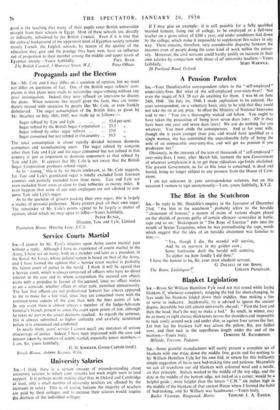Propaganda and the Election
SIR,—Mr. Cole and 1 may differ on a question of opinion, but we must not differ on questions of fact. One of the British sugar refiners com- plaints is that plans were made to nationalise sugar-refining without any prior investigation: Indeed, they were refused an interview 10 discuss the plans. When someone like myself gives the facts, they are imme- diately treated with suspicion by people like Mr. Cole, or even frankly disbelieved. The sugar consumption of the British Isles, as given by Mr. Strachey on July 18th,. 1949, was made up as follows:—
Sugar refined by Tate and Lyle ... ... 53.0 per cent.
Sugar refined by the British Sugar Corporation ... 23.5 Sugar refined by other sugar refiners ... ... 13.0 Sugar consumed but not refilled in this country ... 10.5 The total consumption is about equally divided between domestic consumers and manufacturing users. The sugar refined by concerns other than Tate and Lyle and the sugar consumed but not refined in this country is just as important to domestic consumers as that refined by Tate and Lyle. It appears that Mr. Cole is not aware that the British Sugar Corporation produces refined sugar.
As to " zoning," this is by no means irrelevant, as Mr. Cole suggests, for Tate and Lyle's granulated sugar is totally excluded from fourteen counties and partially excluded from three more. Tate and Lyle are even excluded from areas as close to their refineries as twenty miles. It even happens that some of our own employees are not allowed to con- sume Tate and Lyle's sugar.
As to the question of grocers packing their own sugar, this is largely a matter of personal preference. Many grocers pack all their own sugar. The remainder of Mr. Cole's points appear to be largely a matter of opinion, about which we may agree to differ.—Yours faithfully, PETER RUNGE,
Director, Tate and Lyle, Limited.
Plantation House, Mincing Lane, E.C.3.


































 Previous page
Previous page